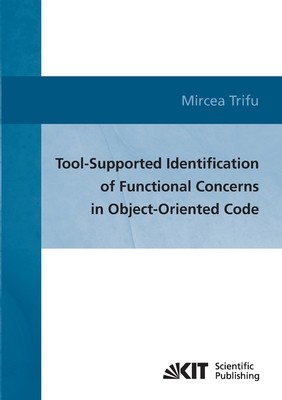
- We will send in 10–14 business days.
- Author: Mircea Trifu
- Publisher: Karlsruher Institut für Technologie
- ISBN-10: 386644494X
- ISBN-13: 9783866444942
- Format: 14.8 x 21 x 1.1 cm, softcover
- Language: English
- SAVE -10% with code: EXTRA
Tool-supported identification of functional concerns in object-oriented code (e-book) (used book) | bookbook.eu
Reviews
Description
Concern identification aims to find the implementation of a functional concern in existing source code. In this work, concerns are described, using the Hierarchic Concern Model, as gray-boxes containing subconcerns, inputs, and outputs. The inputs and outputs are used as concern seeds to identify data-oriented abstractions of concern implementations, called concern skeletons. The identification approach is based on context free language reachability and supported by a tool, called CoDEx.
EXTRA 10 % discount with code: EXTRA
The promotion ends in 20d.17:04:19
The discount code is valid when purchasing from 10 €. Discounts do not stack.
- Author: Mircea Trifu
- Publisher: Karlsruher Institut für Technologie
- ISBN-10: 386644494X
- ISBN-13: 9783866444942
- Format: 14.8 x 21 x 1.1 cm, softcover
- Language: English English
Concern identification aims to find the implementation of a functional concern in existing source code. In this work, concerns are described, using the Hierarchic Concern Model, as gray-boxes containing subconcerns, inputs, and outputs. The inputs and outputs are used as concern seeds to identify data-oriented abstractions of concern implementations, called concern skeletons. The identification approach is based on context free language reachability and supported by a tool, called CoDEx.


Reviews